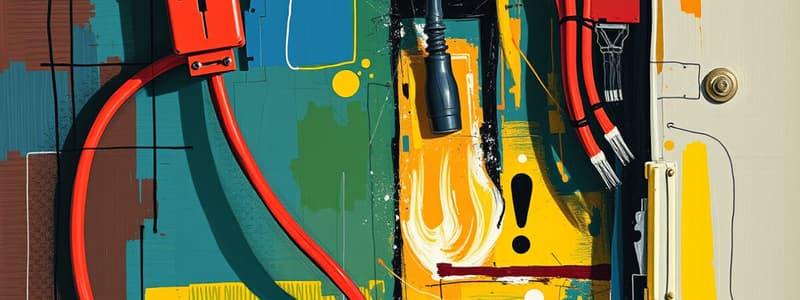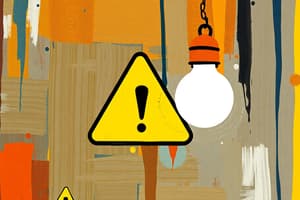Podcast
Questions and Answers
If a hazard may lead to an outcome of death or permanent disability, the level of risk is recognized as ____________ and this should be given the ___________ priority.
If a hazard may lead to an outcome of death or permanent disability, the level of risk is recognized as ____________ and this should be given the ___________ priority.
High, Highest
When implementing measures to control a risk, which of the following control measures should be implemented first?
When implementing measures to control a risk, which of the following control measures should be implemented first?
- Use Administrative controls such as written directives or PPE
- Eliminate the hazard altogether (correct)
- Use Engineering controls to isolate the hazard
What should occur as part of your overall risk management process if an incident occurs?
What should occur as part of your overall risk management process if an incident occurs?
- Nothing as you have already implemented an approved process
- Monitor and Review the risk management program for improvements (correct)
The following determine the effect of an electric shock on the human body...(Select all of the correct responses)
The following determine the effect of an electric shock on the human body...(Select all of the correct responses)
If a low voltage supply can’t be easily isolated, what methods can you use to remove a victim who is suffering from an electric shock? (Select all of the correct responses)
If a low voltage supply can’t be easily isolated, what methods can you use to remove a victim who is suffering from an electric shock? (Select all of the correct responses)
If a victim is suffering an electric shock from a high voltage installation, you should still attempt to rescue them by pulling or pushing them clear.
If a victim is suffering an electric shock from a high voltage installation, you should still attempt to rescue them by pulling or pushing them clear.
Extra low voltage is regarded as completely safe, as the voltage and current levels are not sufficient to harm persons, livestock or property.
Extra low voltage is regarded as completely safe, as the voltage and current levels are not sufficient to harm persons, livestock or property.
An RCD is typically designed to trip when 30mA of earth current is detected. If a person was getting an electric shock of 30mA from an RCD protected circuit, the person would experience a shock with the following expected effects.
An RCD is typically designed to trip when 30mA of earth current is detected. If a person was getting an electric shock of 30mA from an RCD protected circuit, the person would experience a shock with the following expected effects.
The heat generated in a cable is determined using the following formula?
The heat generated in a cable is determined using the following formula?
If the current in a cable is doubled, the heat generated will increase by the following amount?
If the current in a cable is doubled, the heat generated will increase by the following amount?
If the current in a cable is tripled, the heat generated will increase by the following amount?
If the current in a cable is tripled, the heat generated will increase by the following amount?
The maximum continuous current a cable can carry without exceeding its temperature limits is called the..
The maximum continuous current a cable can carry without exceeding its temperature limits is called the..
With all other things constant, what will happen to the temperature of a cable if the current flowing through it increases?
With all other things constant, what will happen to the temperature of a cable if the current flowing through it increases?
Wiring systems shall be selected and installed to be suitable for the highest and lowest local ambient temperature. The designated ambient temperature for cable installations in Australia is:
Wiring systems shall be selected and installed to be suitable for the highest and lowest local ambient temperature. The designated ambient temperature for cable installations in Australia is:
The best installation method for cable entry into a switchboard (from the following) is:
The best installation method for cable entry into a switchboard (from the following) is:
As an electrician you are called out to the job below. The most likely cause of this fault is..
As an electrician you are called out to the job below. The most likely cause of this fault is..
The requirements for recessed luminaires are shown in which clause in AS/NZS 3000?
The requirements for recessed luminaires are shown in which clause in AS/NZS 3000?
Every permanently connected motor needs an isolation switch so that mechanical maintenance can be carried out when needed.
Every permanently connected motor needs an isolation switch so that mechanical maintenance can be carried out when needed.
Flashcards are hidden until you start studying
Study Notes
Hazards and Risks in Electrical Installations
- High-risk hazards can lead to death or permanent disability; these must be given the highest priority.
- When controlling risks, eliminating the hazard altogether is the first action to take.
- Incident management should include monitoring and reviewing the risk management program for continuous improvement.
Effects of Electric Shock
- The impact of electric shock on humans depends on:
- Duration of exposure
- The amount of current flowing through the body
- The current's pathway through the body
Rescue Techniques for Electric Shock Victims
- If a low voltage supply can't be isolated, safe removal methods include:
- Kicking clear with the sole of a boot
- Pulling by loose clothing
- Avoid direct contact with victims in high voltage situations due to the risk involved.
Extra Low Voltage
- Extra low voltage systems are not inherently safe as voltages and currents may still pose hazards.
Residual Current Device (RCD)
- RCDs commonly trip at 30mA; a shock at this level can feel like a strong jolt, potentially causing cramping and breathing difficulties.
Heat Generation in Cables
- Heat generated in a cable can be calculated using the formula: H = I²Rt.
- Doubling the current results in a fourfold increase in heat generated.
- Tripling the current can increase heat generated by nine times.
- The maximum continuous current a cable can carry is known as the Current Carrying Capacity.
Thermal Effects on Cables
- Increased current through a cable raises its temperature due to increased power loss (I²R).
Ambient Temperature Standards
- In Australia, designated ambient temperatures for cable installations are:
- 40°C for air installations
- 25°C for underground installations.
Cable Installation Practices
- The optimal installation method for cable entry into a switchboard includes cutting individual holes and using cable glands combined with fire retardant sealant.
Common Electrical Faults and Legislation
- Common causes of electrical faults include short circuits, faulty circuit breakers, and high resistance joints.
- Recessed luminaire requirements can be found under Clause 4.5.2.3 in AS/NZS 3000.
Isolation Switches
- Isolation switches are essential for all permanently connected motors to facilitate mechanical maintenance.
Studying That Suits You
Use AI to generate personalized quizzes and flashcards to suit your learning preferences.




